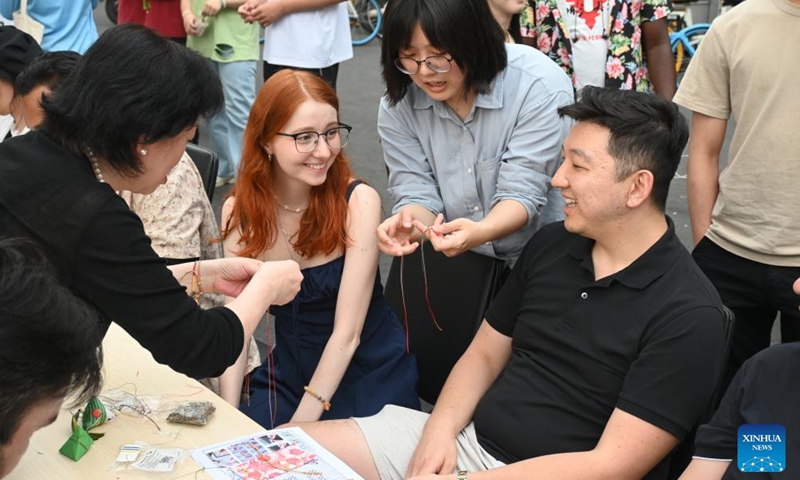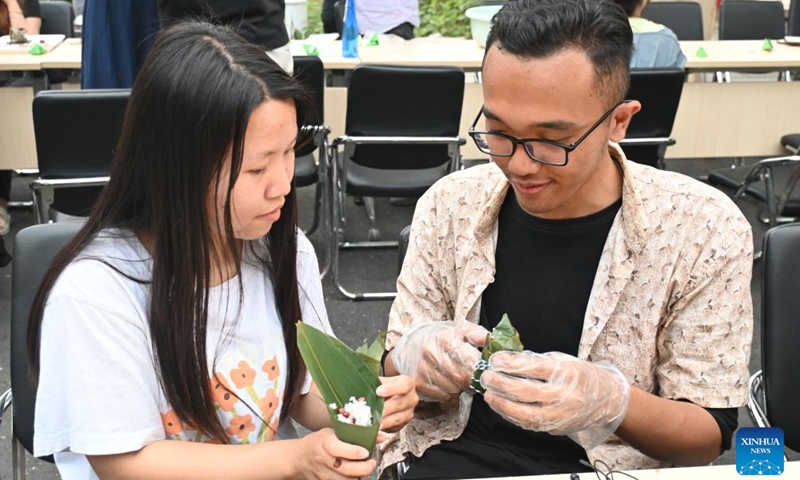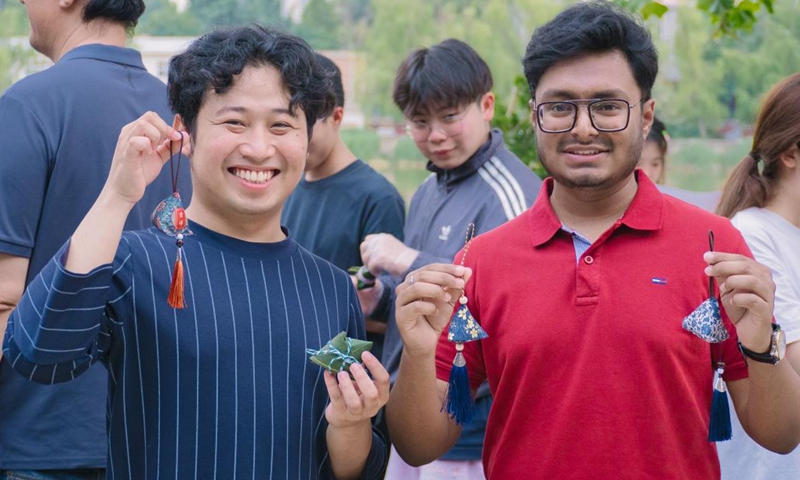
International students learn to weave five-colored bracelets at Tianjin University in north China's Tianjin Municipality, June 6, 2024. (Photo: Xinhua)

An international student from Indonesia (R) makes zongzi under the instruction of a tutor in north China's Tianjin Municipality, June 6, 2024. (Photo: Xinhua)

International students display zongzi and fragrance sachets at Tianjin University in north China's Tianjin Municipality, June 6, 2024. (Photo: Xinhua)
Rolling bamboo leaves into a funnel-like form, stuffing it with sticky rice and various other fillings, and then bundling it all up with a string, Timothy Hutagaol successfully made a delicate zongzi under the guidance of Chinese tutors."Creating zongzi is a new venture for me, proving somewhat harder than making dumplings, but I bet self-made zongzi tastes superior," said Hutagaol, an Indonesian student at Tianjin University in north China's Tianjin Municipality.
Zongzi, also known as sticky rice dumplings, is a traditional delicacy that Chinese people eat on the day of the Dragon Boat Festival, which will be celebrated on June 10 this year.
Hutagaol was just one of over 60 international teachers and students at Tianjin University, from countries including Indonesia, Russia, Pakistan, Nigeria and Mongolia, to participate in a zongzi-making event organized by the university's School of International Education on Thursday.
"Zongzi commemorates Chinese renowned patriotic poet Qu Yuan, who was also a minister of the State of Chu during the Warring States Period (475 BC-221 BC). It expresses good wishes for auspiciousness and well-being," said Sun Shuo, a Chinese student at the university. She highlighted the cultural significance of zongzi while demonstrating steps to make zongzi to the international participants.
Today, people also wrap various other fillings like egg yolk, sweetened bean paste and pork in zongzi to cater to consumers' evolving tastes, Sun added.
Shishir Sharma, who hails from Nepal, is a teacher in the School of Pharmaceutical Science and Technology at Tianjin University. Living in China for nearly 10 years now, he has found many unique delicacies linked with Chinese traditional festivals, which beautifully and tastily represent China's profound history and culture.
Sharma said he could truly feel and understand Chinese people's commemoration of the sage and aspirations for better lives while tasting Zongzi.
"Feasting after laboring gives a particularly delightful taste," said Mroivili Faouzia, a student from Comoros.
In addition to preparing zongzi, other celebratory activities, such as making sachets and weaving five-colored bracelets, were also introduced to the international participants.
"I love the centuries-old traditions of the Dragon Boat Festival, which reflect Chinese-style romance," said Russian student Bitsaeva Liudmla, who hung her own handmade sachet on her backpack. She is also eager to participate in dragon boat racing.
"The Dragon Boat Festival is the first Chinese festival to be included on the UNESCO Intangible Cultural Heritage List. By hosting this event, we hope to offer international friends an immersive experience of Chinese folk customs, promoting cultural exchange and mutual understanding," said Li Qiang, dean of the School of International Education at Tianjin University.
